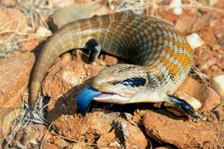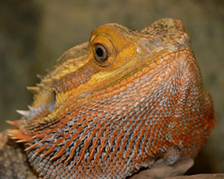Source: Gary West, 785-532-4867, gwest@vet.k-state.edu
Photo available. Contact media@k-state.edu or 785-532-6415.
News release prepared by: Kristin Hodges, 785-532-6415, khodges2@k-state.edu
Thursday, June 18, 2009
K-STATE VETERINARIAN SAYS WHILE EXOTIC PETS CAN BE GREAT COMPANIONS, THERE ARE HEALTH FACTORS THAT CAN AFFECT BOTH THE ANIMAL AND HUMANS
MANHATTAN -- Owners of exotic animals like reptiles and birds need to be aware of illnesses that can affect both their pet and humans, according to a Kansas State University veterinarian.
Gary West, assistant professor of zoological medicine in K-State's College of Veterinary Medicine, said exotic animals can make fun and interesting pets, but there are many health factors to consider before owning one.
 West said common exotic pets are ferrets, rabbits, guinea pigs, reptiles and birds. He recommended several of these animals as good pets, including cockatiels, guinea pigs, rabbits, bearded dragons, corn snakes, blue-tongued skinks, some species of tarantulas, freshwater tropical fish and some tortoises.
West said common exotic pets are ferrets, rabbits, guinea pigs, reptiles and birds. He recommended several of these animals as good pets, including cockatiels, guinea pigs, rabbits, bearded dragons, corn snakes, blue-tongued skinks, some species of tarantulas, freshwater tropical fish and some tortoises.
Owning an exotic pet is different from owning pets like dogs and cats. Some exotic pets have specialized needs, such as lizards that require an ultraviolet light for basking, live insects for food or other whole prey items, West said.
"Many of our diets and health care are very advanced for dogs, which have been domesticated for a long time," he said. "Many exotic pets are non-domestic, and although many advances have been made, there are still things we are learning about them."
West said there are fad exotic animals every few years that can be challenging to own, such as a kinkajou. West said this South American animal is related to the raccoon and typically does not make a good pet because of special environmental requirements and that it can bite.
He said all exotic animals have specific needs and requirements, and it is important that the pet owner become educated about the animal before purchasing it. He said the best way to keep an exotic pet healthy is to know what it requires to stay healthy and thrive.
Exotic animals can carry diseases, West said. Reptiles are commonly known to be at risk of carrying salmonella, and there have been reports of other diseases, including chlamydia, in pet birds. Rabies also is a concern for mammals if they go outdoors.
However, unlike dogs and cats, exotic pets like reptiles can carry diseases like salmonella without getting sick -- but that puts other animals and humans at risk.
West said after handling an exotic pet, people should wash their hands immediately. He also said reptiles should not be allowed to roam free, they should not be allowed in the kitchen or around people who are eating, and owners should disinfect surfaces where reptiles have been. Additionally, the U.S. Centers for Disease Control and Prevention recommends that reptiles not be kept in homes with children younger than 5 years or with immunocompromised people, he said.
West said typically there are no signs or symptoms to tell if an exotic animal is a carrier of salmonella or other diseases, though the animal could infect other pets. To keep other pets from getting the diseases, West said the same principles for humans apply. Other animals should not come into direct contact with the exotic pet, for mutual benefit, and the animals should keep away from each other's food and water bowls.
 Some exotic animals do not like much handling, noise or strangers, and agitating the animal puts the owner at risk for bites and scratches. Bite wounds can become infected with bacteria from the pet's mouth and should be examined by a doctor. Additionally, injuries are fairly common in small pets, so owners should be careful when the animal is around larger animals like dogs or around young children, West said.
Some exotic animals do not like much handling, noise or strangers, and agitating the animal puts the owner at risk for bites and scratches. Bite wounds can become infected with bacteria from the pet's mouth and should be examined by a doctor. Additionally, injuries are fairly common in small pets, so owners should be careful when the animal is around larger animals like dogs or around young children, West said.
"We see many cases where the family cat or dog injures or bites the exotic pet, which are often can be life-threatening wounds," he said.
He said owners should not impulse-buy pets, especially exotic animals. People also should buy from a good source who is knowledgeable about husbandry and care, and the source should also be able to recommend good products and guarantee that the animal is healthy.
West also said to see if the source is selling species that make good pets. He said there are many animals that should not be pets, such as monkeys. Primates make bad pets for several reasons, he said, including because they can carry diseases that are transmissible to humans.
"Wildlife do not make good pets, and it is illegal and irresponsible to take a baby animal from the wild and raise it or make a pet out of it," West said. "You are not helping it."
West said owning a pet can be good for children as a way to learn patience and responsibility, and all pets can be great companions and even stress relievers.
"Watching your fish or learning more about these fascinating creatures can be great hobbies for children and adults," he said. "Observing and learning about their behavior can be very interesting and help foster an interest and love for animals and wildlife."